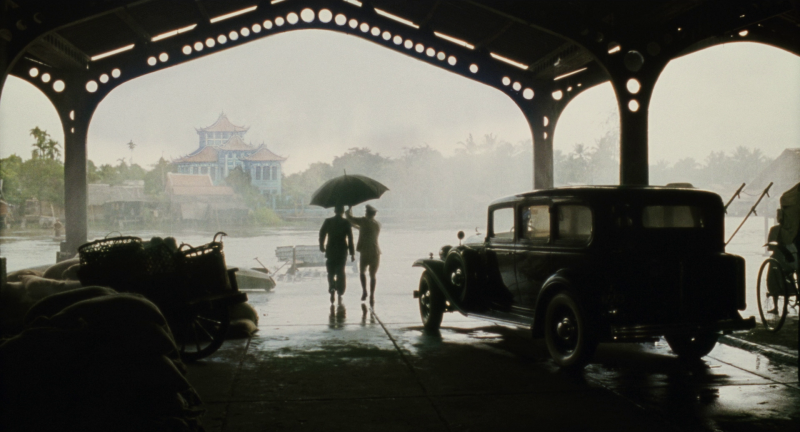 Please note that all framegrabs are from the 1080p version
Please note that all framegrabs are from the 1080p version
**/**** Image A- Sound A- Extras A-
starring Jane March, Tony Leung, Frederique Meininger, Arnaud Giovaninetti
adapted by Gerard Brach, Jean-Jacques Annaud, based on the novel by Marguerite Duras
directed by Jean-Jacques Annaud
By Bill Chambers
“What must have happened is: I try it on just for fun, look at myself in the shopkeeper’s glass, and see that there, beneath the man’s hat, the thin awkward shape, the inadequacy of childhood, has turned into something else. Has ceased to be a harsh, inescapable imposition of nature. Has become, on the contrary, a provoking choice of nature, a choice of the mind. Suddenly it’s deliberate. Suddenly I see myself as another, as another would be seen, outside myself, available to all, available to all eyes, in circulation for cities, journeys, desire. I take the hat, and am never parted from it. Having got it, this hat that all by itself makes me whole, I wear it all the time.”
That’s author Marguerite Duras in the opening pages of her best-selling 1984 memoir L’Amant, describing the “brownish-pink fedora with a broad black ribbon” she wore as a girl of 15-and-a-half. If you remember anything about Jean-Jacques Annaud’s eponymous 1992 feature-film adaptation The Lover (apart from its prurient reputation, that is), chances are it’s that hat, which actually captures some of the mythic quality Duras is getting at in the above-quoted passage. Watching the recent Holler, I realized that when I think back on it, I will likely remember it not as a movie about scrappers living in poverty but as the one with the girl in the Steve Zissou-esque red-knit beanie. Hats are incredibly cinematic, bestowing story and subtext on an actor’s face. Yet while the hat that 19-year-old newcomer and former teen cover girl Jane March wears in The Lover may strike the right note of self-assurance, the pigtails sticking out from under it combine to give her an Anne of Green Gables look that hardly contradicts “the inadequacy of childhood,” and I think that’s deliberate. From the get-go, she’s not just exotic fruit, she’s forbidden fruit. The Lover takes a short, discursive book without dialogue typical of the Hiroshima mon amour screenwriter and almost miraculously extrapolates a linear, if episodic, framework from it, but it leans into the sordid details that Duras almost glosses over.
